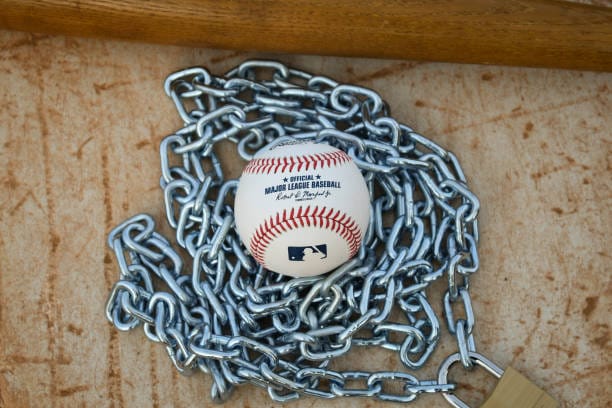MLB's Looming Crisis: Is a Lockout Inevitable After 2026?
As excitement builds for another thrilling MLB season, an underlying storm is brewing that could halt America's pastime in its tracks. With the current CBA set to expire in 2026, experts warn that a lockout is 'likely' as owners and the Players Association clash over a potential salary cap

The crack of the bat, the roar of the crowd, and the unmistakable scent of fresh-cut grass—baseball is back! But as the 2025 season kicks off, an ominous question looms over the sport: what happens after 2026?
According to Evan Drellich of The Athletic, a lockout following the 2026 season is now "likely." The reason? A fierce standoff between MLB owners and the Players Association over the next Collective Bargaining Agreement (CBA). The key sticking point: a potential salary cap that team owners appear to favor but players vehemently oppose.
The Battle Lines Are Drawn
The current CBA officially expires on December 2, 2026. While that might seem like a long way off, history suggests negotiations will need to heat up within the next 12 to 18 months to avoid another debilitating work stoppage.
Owners reportedly support a salary cap but are wary of triggering conflict. However, history tells us that securing their financial goals may come at the cost of a war between management and labor—a battle that could end in a lockout or strike.
The MLB Players Association has long rejected salary caps, viewing them as an unfair limitation on what players can earn. Given that stance, if owners push for one, a prolonged work stoppage could be inevitable.
The Changing Economics of Baseball
Baseball’s financial ecosystem is shifting rapidly. Consider this:
- The gap between the highest-spending teams and the lowest is staggering, with some teams shelling out over $300 million while others scrape by under $100 million.
- TV deals, once a lucrative revenue stream, are becoming less reliable. Multiple teams have been forced to renegotiate short-term contracts, often for reduced fees.
- Stadium financing is increasingly falling on team owners rather than public funding, raising long-term operational costs.
All these factors combined have owners looking for ways to stabilize profits, which may be why a salary cap is suddenly back on the table.
What’s at Stake?
Commissioner Rob Manfred has hinted that league decision-making now centers more directly on owner demands rather than his independent leadership. This shift in power could further complicate labor negotiations, especially if a unified front does not emerge among team owners.
For fans, a work stoppage would be nothing short of devastating. The last MLB lockout in 2021-22 lasted 99 days before a compromise was reached. Another similar—or worse—scenario could jeopardize the start of the 2027 season.
A Salary Cap Fight—or a Bigger Problem?
While the cap vs. no cap debate is central to the impending showdown, there’s another equally crucial issue: the salary floor. Some owners may welcome strict spending limits, but others fear being forced to spend more just to meet a potential minimum requirement.
With some teams strategically cutting costs to pocket luxury tax revenue, debates over whether to mandate higher spending for smaller-market franchises will further complicate negotiations.
The Bigger Picture: MLB Falling Behind?
Financially, MLB appears to be trailing behind other major North American sports leagues. Compared to the NFL and NBA, baseball franchise values have stagnated due to revenue instability and team spending disparities.
Without a long-term solution, the league risks further devaluation, which some believe a salary cap could help prevent. However, any attempt to implement strict revenue controls will undoubtedly spark fierce opposition.
Countdown to Conflict
With a showdown between owners and players almost inevitable, the question isn’t if a standoff will happen but when. Barring a miraculous agreement in the next year or two, fans should brace for another bitter dispute that could once again put baseball on hold.
Will the love of America’s pastime prevail? Or are we doomed for another frustrating battle over billions? Let us know your thoughts in the comments below!